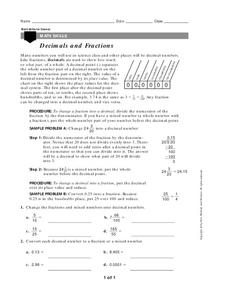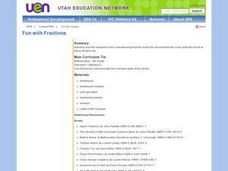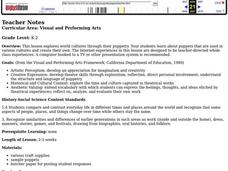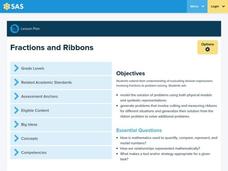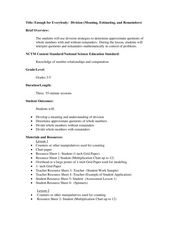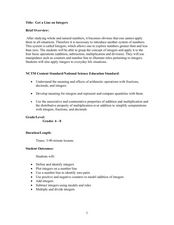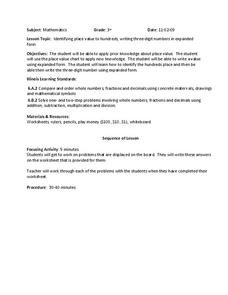Curated OER
The Multiplier (larger 2-digit by 1-digit numbers)
Students utilize number sense applications to multiply two digit numbers. They use "The Multiplier" and Internet source to partition and solve 2 digit by 1 digit multiplications. Students describe how to solve 2-digit by 1-digit...
Curated OER
Fractions in Shapes
First graders explore fractions with manipulatives. In this fraction lesson, 1st graders use paper foods such as sandwiches and pizza in order to find halves, thirds, fourths, eighths, and more. This lesson is divided up into 3 tiers...
Curated OER
Average and Percentages - Week 2
In this average and percent learning exercise, students solve percentage problems by using proportions. These story problems include sequences, percent of change and cost. This two-page learning exercise contains seven problems.
Virginia Department of Education
Cell Parts
What do a bird, an egg, a rabbit, and a toad all have in common? This fun-filled resource explains the similarities and differences between cells and how all cells are similar, yet all are different. Learners begin by depicting a...
Curated OER
Decimals and Fractions
In this decimals and fractions worksheet, students read about decimals and fractions and how to change one to the other. They solve two multi-part problems practicing converting decimals to fractions and fractions to decimals.
Curated OER
Fractions of a Sheet Cake
Second graders become familiar with the fractions in a whole. In this sheet cake lesson, 2nd graders view a Count on it clip about pumpkin pies. Students cut a sheet cake into eight parts and write as a fraction. ...
Curated OER
Fraction Conversion 2 (With Percents)
Fifth graders determine how to convert fractions, decimals, and percents. In this conversion lesson, 5th graders use an on-line applet to practice making these conversions. They review how to make the conversions in a whole class lesson...
Curated OER
New: Fun with Fractions
Third graders determine that the larger the denominator the more parts the whole is being divided into. They use fractions to communicate and compare parts of the whole. They discover what the numerator and denominator of a fraction...
Curated OER
Funtastic Fractions
Students discover fractions by creating models. In this fractions lesson plan, students read Give Me Half! by Stuart J. Murphy and view a video about what fractions actually represent. Students divide a square piece of paper a certain...
Curated OER
Fraction Frenzy
Second graders identify fractions as part of a set. They explain concrete and symbolic representations of whole numbers, fractions, decimals, and percents in real-world situations. They complete a web-based cookie baking lesson.
Curated OER
Plato and The Republic
Students recognize that in the book The Republic, Plato described the ideal society. They adopt, modify, or reject Plato's views as they describe another, smaller ideal society: Utopia High School. In addition, they summarize the...
Curated OER
Searching the Net
Students create a Native American Nation flip book. In this Native American lesson, students choose one of four Native American Nations: The Iroquois, Hopi, Seminoles, Sioux. They research them on the Internet using teacher given...
Curated OER
PUPPETRY
Young scholars explore world cultures through their puppetry. Your students explore puppets that are used in various cultures and create their own. The Internet experiences in this lesson are designed to be teacher-directed whole class...
Curated OER
Fractions in Everyday Life
Students apply understanding of fractions by converting a recipe to feed the class and the whole grade level. They calculate how many cookies the class would eat and multiply each fraction in the recipe accordingly.
Curated OER
Process of Mitosis
Students discover through whole-class role play, the process of mitosis. They will all become a chromosome and demonstrate how they line up 23 to 23.
Curated OER
Order of Operations
Learn the rules for the order of operations with an electronic worksheet. Learners evaluate whole-number expressions and translate a word problem into an arithmetic expression. The resource includes several examples for each rule.
Curated OER
Drama: Working Together
Students participate in a host of activities designed to encourage creativity, collaboration, and cooperation. They experience walking in different ways, greeting various types of people, and mirroring, where one student duplicates the...
National First Ladies' Library
Impeachment!
Young scholars investigate the impeachment proceedings against Andrew Johnson, Richard Nixon, and William Clinton. In small groups they conduct Internet research on one of the three Presidents, and present a "brief" on the case,...
Curated OER
Johnson, Louis and Ali
Students research the lives of Jack Johnson, Muhammad Ali and Joe Louis. In groups, they analyze the life of one of these boxers. They create their own presentation and share with the class.
Pennsylvania Department of Education
Fractions and Ribbons
Fifth graders solve division problems using partial quotients. In this long division lesson, 5th graders practice seeing division as a process of repeated subtraction and estimation. This lesson provides a script for the teacher.
Curated OER
Enough for Everybody: Division
Students study division. In this math lesson, students arrange manipulatives into equal groups. Students discuss the relationship between multiplication and division.
Curated OER
Models for Dividing Fractions
Sixth graders represent division of fractions using manipulatives, such as freezer pops, candy bars, and models such as drawings squares. They develop an algorithm from these examples and solve problems using fractions.
Curated OER
Get a Line on Integers
Middle schoolers explore number sense by completing math function problems in class. In this integers lesson, students define integers and practice plotting them on a number line. Middle schoolers utilize math functions such as addition...
Curated OER
Identifying Place Value
Third graders complete math problems. In this place value instructional activity, 3rd graders solve problems that require them to write the place value of a number in expanded form and identify the place value and expanded form of...




